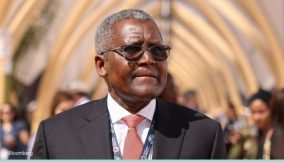Funke Opeke, the founder of Main One Cable Company, a communications services firm, has touted human capacity, natural resources, drive and grit as Nigeria’s solution to its economic challenges.
Opeke made this known at the 2024 Women in Successful Careers (WISCAR) annual leadership and mentoring conference held in Lagos.
Speaking on the theme; “Fueling Resilience: Empowering Diversity for Economic Success”, Opeke said Nigeria’s human capacity, natural resources and grit can help it thrive despite the economic challenges.
“When I think of the current challenges in our economy, I know from the experience of having economic fortunes that we do have the human capital, the natural resources, the intellect, the drive, capacity, indeed, the grit, for this country to thrive,” she said.
The WISCAR “Distinguished Award Recipient” 2024 said though Nigeria’s economic challenges bites hard on people’s businesses and lives, it is part of success journey in life.
“No one achieves great success without challenges along the way, and we know times are hard here in Nigeria because even though the statistics suggest improved economic growth, the increasing poverty we see around us is powerful.
Read also: Funke Opeke, MainOne founder, resigns, becomes advisor
“Businesses are shrinking and neither expanding nor hiring; we have many of our compatriots who continue to leave or ‘japa’ in search of greener pastures, there’re a lot of inherent prospects in Nigeria,” she noted.
She explained that the numerous challenges in the country, such as pre-industrialisation with power, transportation, security and digital transformation unlike the advanced countries where economies are driven by artificial intelligence, there is hope if citizens remain resilient, diversified and focused.
“The improbable is not always a straight road, but with resilience, all that great improbable can be done; and as Nelson Mandela said, it always seems impossible until it is done.
“So when I think of resilience, I think of a few situations I had along the way building Main One which may have caused me to turn back. If you’re in business and you’re in this audience today, you have to be very good at the basics. Focus on your customers and business fundamentals to weather the storm,” she counseled.
Besides, she said; “While we hope, as Nigerians that the brighter future would be upon us now, it is clear with our noble greed attitude, our large youth population, growing gender diversity in business, and indeed the tech sector, increased access to information and educational opportunities that someday our nation will be able to provide improved opportunities for all the citizens to grow and thrive.”
Amina Oyagbola, the founder of WISCAR in her address said the organisation has deepened its advocacy efforts, forging strategic partnerships focused on women’s leadership and the implementation of the Women Economic Empowerment Policy, Nigeria’s current premier framework for advancing women’s economic participation.
“We have continued to refine our work in alignment with our vision: to develop women to build a better nation, and our revised mission: to elevate women into leadership roles through structured mentorship, career development, and advocacy, driving gender-equitable policies across public, private, and development sectors,” she said.
Oyagbola regrets that, even as the 30th anniversary of the Beijing Declaration in 2025 is fast approaching, the realities for women and girls in Nigeria remain bleak.
“Nigeria’s ranking on the World Economic Forum’s Gender Gap Index is poor, ranking in the top 10 percent of countries with the highest gender discrimination on the OECD’s Social Institutions and Gender Index.
These indicators highlight enduring systemic challenges such as discriminatory family codes, restricted access to resources, and limited civil liberties for women.
“Although a signatory to international conventions such as the Convention on the Elimination of All Forms of Discrimination against Women (CEDAW), implementation within Nigeria remains utterly inadequate,” she noted.
Beatrice Eyong, the UN Women Country Representative to Nigeria and ECOWAS in her goodwill message said, women have consistently demonstrated remarkable resilience, excelling as caregivers, professionals, entrepreneurs, and leaders; despite facing unique challenges.
“Women-led businesses often stand out in economic hardship for their resourcefulness, creativity, and effective risk management. However, the structural barriers that hinder women’s full participation in the economy must be addressed to unlock their potential fully,” she said.
Recognising this need, she explained that the National Women Economic Empowerment (WEE) Policy and Action Plan 2023 was developed.
“This policy aims to create an enabling environment to mitigate these challenges and advance women’s economic inclusion. Its key targets include increasing women’s labour force participation to 65 percent, expanding their role in agriculture to 30 percent, and ensuring women occupy 25 percent of board seats and 30 percent of senior management positions in companies listed on the Nigerian Stock Exchange.
Additionally, the policy seeks to enhance Nigeria’s ranking on the Global Gender Gap Index, boost women’s financial inclusion to 75 percent, and achieve a 75 percent enrollment rate for girls in secondary education,” she said.
One of the highlights of the event was the Grace Alele-Williams Award 2024 given to Dolapo Agbede, a physical challenged successful career woman for her resilience.
Some dignitaries at the conference include Olufolake Abdulrazaq, the first lady of Kwara State; Ahmed Gobir, president of CIPM; Esosa Balogun representing MTN, Nigeria; and Rachel Adeshina, chief information officer at First Bank.
WISCAR is a non-profit organisation dedicated to empowering and developing the next generation of women in professions and careers, preparing them for leadership.
Join BusinessDay whatsapp Channel, to stay up to date
Open In Whatsapp





